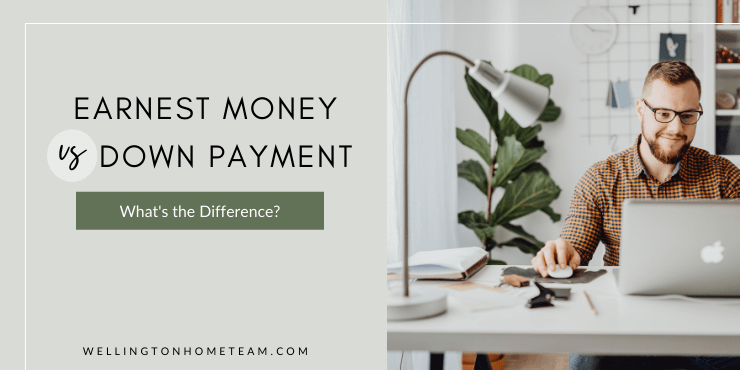Earnest Money VS Down Payment | What’s the Difference?
If you aren’t familiar with the terms real estate agents and other professionals involved in home buying use, things can get confusing. Two of these frequently confusing terms are “earnest money” and “down payment,” and while there are some similarities, they shouldn’t be confused.

There are important differences you need to understand between these terms, let’s take a closer look at earnest money deposit vs down payment now!
What is an Earnest Money Deposit?
Earnest money, or an escrow deposit, is the amount of money a buyer agrees to put into an escrow account when their offer is accepted by the seller.
Putting a large escrow deposit down shows the seller a few things. One, the buyer is serious about purchasing their home. Two, it shows that the buyer has money for their down payment and/or closing costs, pending on how much money they put in escrow. Lastly, it shows the seller how confident the buyer is in their ability to purchase their home.
While in most cases a buyer can get their earnest money deposit back if things fall apart within their contingency period. However, if the purchase falls through after contingencies have been removed the buyer could forfeit the deposit to the seller. So sellers will be looking for the largest possible escrow deposit.
What is a Down Payment?
 The down payment is a percentage of the purchase price that the buyer pays to the seller. This is paid to the seller during closing, either wired from the buyer’s account or given as a cashier’s check. The rest of the purchase price is provided by the lender.
The down payment is a percentage of the purchase price that the buyer pays to the seller. This is paid to the seller during closing, either wired from the buyer’s account or given as a cashier’s check. The rest of the purchase price is provided by the lender.
This down payment could come from the buyer’s savings, from the money received when they sold a previous property, or even gifted from a relative.
If you are buying a home and don't understand the difference between an earnest money vs down payment this article is for you. #realestate #homebuying #downpaymentHow is Earnest Money and a Down Payment Different?
There are many differences between these two payments. While both require handing over a percentage of the purchase price, they shouldn’t be confused. Earnest money needs to be paid into escrow when the offer is accepted. But the down payment is paid at closing and is likely to be a larger sum of money.
The down payment will go directly to the seller in addition to the mortgaged amount to pay for the home. Whereas the earnest deposit goes into escrow. When the buyer closes on the home, the escrow money is released and goes towards the closing costs and/or down payment.
Earnest money is a deposit that is at risk if the buyer doesn’t meet their obligations in the purchase contract. So if the buyer decides they don’t want to buy the house after all, the seller could get the deposit to compensate them. However, there are situations when the buyer can walk away from the deal, and have their deposit returned to them. Contingencies are clauses that stop the buying process should certain things not happen or problems arise.
The home inspection contingency is a common clause that allows the buyer to exit the deal. If the home inspector finds that serious repairs are required to the home, and the buyer and the seller can’t agree to repairs or a reduction in the purchase price, the contingency gives the buyer a way out.
Other contingencies might relate to financing, the sale of the buyer’s home, the appraisal, and the problems with the title. While the seller might not like these contingencies and the buyer backing out of the purchase, they will be entitled to their deposit back if the contingency is in the agreement.
How Much Earnest Money Will I Have to Pay?
This deposit is typically around 3% of the offer price on the home. It can be higher, however, depending on the real estate market and your location. The earnest deposit can go as high as 10% or as low as 1%.
 You can expect to need to put between $10,00 and $20,000 into the escrow account when buying a property for $500,000. The amount can be suggested by the buyer, and the seller can agree to this, or reject it, or choose to negotiate.
You can expect to need to put between $10,00 and $20,000 into the escrow account when buying a property for $500,000. The amount can be suggested by the buyer, and the seller can agree to this, or reject it, or choose to negotiate.
The financing arrangement of the buyer can influence the amount of earnest money paid. The seller could request a larger deposit if the buyer is making a cash offer, for example. This ensures that the buyer is genuinely committed to moving forward with the purchase process.
The escrow deposit can usually be paid by the buyer with a personal check given to a third party, like a title company.
However, if it’s a quick closing the check may not have enough time to clear, so a cashier’s check or wiring the deposit will be required. An escrow deposit should never be paid directly to the seller. It should always go to the closing company or one of the real estate brokerages involved in the transaction.
An escrow deposit check will be cashed, so make sure the funds are available and it will be a credit towards closing costs or as part of the down payment.
If you are buying a home and don't understand the difference between an earnest money vs down payment this article is for you. #realestate #homebuying #downpaymentWhat Down Payment Do I Need to Save?
Traditionally, a 20% down payment was the norm, fortunately, that isn’t the case anymore. Finding 20% down for a $250,000 home would require the buyer to have $50,000 plus closing costs. These sort of figures are out of reach for a lot of home buyers, but there are many options that allow buyers to purchase with far less money saved.
 It is even possible in some circumstances to buy with zero down, though around 3%-5% is more typical. Lenders dictate the down payment requirement, but if you can afford 20% or get closer to that amount, you will benefit from better terms from the lender.
It is even possible in some circumstances to buy with zero down, though around 3%-5% is more typical. Lenders dictate the down payment requirement, but if you can afford 20% or get closer to that amount, you will benefit from better terms from the lender.
With 20% down, you can avoid the need to pay private mortgage insurance each month. This insurance protects the lender should you fail to keep up with your payments. Mortgage insurance isn’t cheap either and could be 1% of the home loan or $1,000 per $100,000 of money loaned. You will have to keep paying this every year until you have 20% equity in the property.
You shouldn’t use all of your available savings on the down payment, however, there are other expenses as well. The closing costs are another expense that buyers need to have the funds to pay for when the home closes.
Final Thoughts
Buying a home brings with it many expenses which the down payment and earnest money are part of. Before you begin the search for your ideal home, you need to be sure that you can cover these costs. It might mean stretching your finances, but the sacrifices will be worth it to achieve your goal of owning a home. Understanding the difference between earnest money and down payment is the first step.
Please consider spreading the word and sharing; Earnest Money VS Down Payment | What’s the Difference?
If you are buying a home and don't understand the difference between an earnest money deposit and a down payment this article is for you. #realestate #homebuying #downpayment
Popular Questions About Earnest Money VS Down Payment
Does earnest money go towards down payment or closing costs? Traditionally yes, an earnest money deposit will be applied towards a buyer’s down payment and/or closing costs at closing.
Is earnest money refundable? It depends on the contract, but if a buyer is within their contingency period and cancels the contract they could be eligible to remove their entire deposit back.
When is earnest money due? This too depends on the contract but traditionally a portion of the escrow deposit will accompany the offer or be collected within a few days of acceptance. Then a second deposit will be collected a week or so later unless the buyer puts the entire escrow down upfront.
How much is earnest money? On average the escrow deposit is 3% of the purchase price but sometimes a seller will accept less and in some cases they may want more.
Is earnest money required? Almost everything is negotiable in real estate but it’s unlikely a seller will accept an offer with no money down.
About the Author
Top Wellington Realtor, Michelle Gibson, wrote: “Earnest Money VS Down Payment | What’s the Difference?”
Michelle has been specializing in residential real estate since 2001 throughout Wellington Florida and the surrounding area. Whether you’re looking to buy, sell, or rent she will guide you through the entire real estate transaction. If you’re ready to put Michelle’s knowledge and expertise to work for you call or e-mail her today.
Areas of service include Wellington, Lake Worth, Royal Palm Beach, Boynton Beach, West Palm Beach, Loxahatchee, Greenacres, and more.

 Michelle Gibson of the Hansen Real Estate Group Inc is a full-time REALTOR who has been specializing in Wellington, Florida real estate since 2001. This veteran of the real estate industry has expertise in technology, marketing, and social media.
Michelle Gibson of the Hansen Real Estate Group Inc is a full-time REALTOR who has been specializing in Wellington, Florida real estate since 2001. This veteran of the real estate industry has expertise in technology, marketing, and social media.